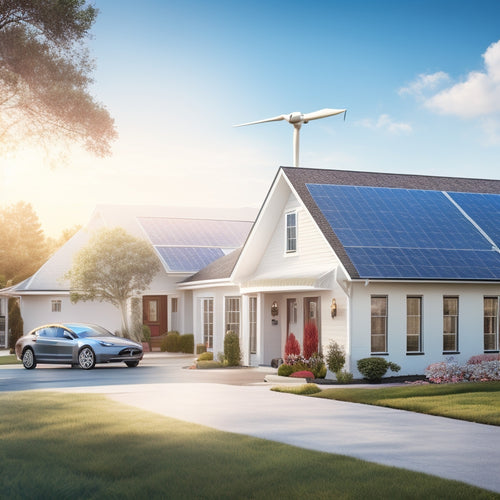
Homeowners' Guide to Long-Lasting Panel Performance
Share
As a homeowner, you're likely aware that solar panels can last up to 30 years or more, but did you know that even high-quality panels can degrade by 0.5% to 1% per year? Regular monitoring and maintenance are essential to maximize energy output and lifespan. You'll want to understand the factors affecting panel durability, from environmental stress to material quality and installation. By knowing what to look for and how to maintain your panels, you can prevent degradation and secure long-term energy savings. As you explore the world of solar panels, you'll uncover even more secrets to getting the most out of your investment.
Key Takeaways
• Regular monitoring and maintenance are crucial to ensure optimal solar panel performance and extend lifespan.
• High-quality panels with proper installation can last over 40 years, maintaining up to 90% efficiency after 20 years.
• Environmental stress factors like temperature fluctuations, humidity, and exposure to chemicals can impact panel durability.
• Proper maintenance tasks, including cleaning and inspections, can prevent energy loss and identify potential issues early.
• Selecting reputable suppliers and skilled installers is essential for ensuring a long-lasting and efficient solar panel system.
Understanding Solar Panel Degradation
Monitoring your solar panel's performance, it's imperative to recognize that degradation is an inevitable process that will gradually reduce its energy output over time. Think of it like your favorite pair of jeans - they might still look great, but they're not as comfy as they used to be.
In the case of solar panels, degradation is a natural process that affects their efficiency metrics. You'll want to keep a close eye on your panel's performance tracking to make sure you're getting the most bang for your buck.
To put it into perspective, a typical solar panel's efficiency can degrade by around 0.5% to 1% per year. That mightn't seem like a lot, but it can add up over time. By regularly monitoring your panel's performance, you can identify any issues early on and take corrective action.
This might involve cleaning the panels, replacing faulty components, or adjusting the panel's angle to optimize energy output. By staying on top of your panel's performance, you can guarantee it continues to perform at its best, even as it ages.
Average Lifespan of Solar Panels
Now that you've grasped the concept of solar panel degradation, it's time to explore the average lifespan of these energy-efficient wonders.
While the rate of degradation varies depending on factors like quality, maintenance, and environmental conditions, a typical solar panel's average lifespan ranges from 25 to 30 years, with some high-quality panels lasting upwards of 40 years. That's a significant amount of time to reap the benefits of renewable energy!
In fact, studies have shown that solar panels can maintain up to 90% of their original efficiency after 20 years of operation, making them a reliable choice for homeowners seeking long-term energy savings.
When it comes to solar panel reliability, energy efficiency is key. By choosing high-quality panels and maintaining them properly, you can guarantee excellent performance and maximize your return on investment.
With proper care, your solar panels will continue to harness the sun's energy for decades to come, providing you with a clean, sustainable source of power for years to come.
Factors Affecting Panel Durability
When evaluating the durability of your solar panels, you'll need to take into account the factors that impact their performance over time.
You'll find that environmental stress factors, such as temperature and humidity, can greatly affect panel longevity.
Additionally, the quality of the materials used and the installation process itself will also play crucial roles in determining your panels' overall durability.
Environmental Stress Factors
Environmental stress factors, including temperature fluctuations, humidity, and exposure to chemicals, can greatly impact the durability of your panel, leading to premature degradation or failure. You might think you're doing everything right, but Mother Nature can be a real panel-killer.
Natural disasters like hurricanes, tornadoes, and wildfires can cause physical damage, while air pollution can corrode your panel's surface. And let's not forget about the sneaky ones: temperature fluctuations can cause expansion and contraction, leading to micro-cracks and weaknesses.
As a homeowner, it's crucial to take into account these environmental stress factors when choosing and maintaining your panel. You can't control the weather, but you can take steps to mitigate its effects.
Make sure to install your panel in a way that allows for thermal expansion, and consider applying a protective coating to shield it from air pollution. By being mindful of these environmental stress factors, you can take proactive steps to guarantee your panel lasts for years to come.
Material Quality Matters
When selecting a panel, you're not just buying a product - you're investing in the quality of the materials that will determine its durability and lifespan. It's important to take into account the raw material sourcing and manufacturing standards of your panel.
Here are three key factors to keep in mind:
-
Raw Material Sourcing: Make sure that the materials used are of high quality and sourced from reputable suppliers. This can greatly impact the panel's performance and longevity.
-
Manufacturing Standards: Look for manufacturers that adhere to strict quality control measures and have certifications from recognized organizations. This guarantees that the panels meet specific standards for durability and performance.
-
Material Composition: Be mindful of the materials used in the panel's construction, including the type of glass, frame, and sealants. A well-designed panel with high-quality materials can withstand environmental stress factors and last longer.
Installation Quality Counts
You'll greatly impact your panel's durability by ensuring a high-quality installation, as improper mounting and connections can negate even the best material choices. A subpar installation can lead to a plethora of issues, including water damage, electrical problems, and reduced energy efficiency. That's why it's essential to work with an installer who possesses the necessary expertise and follows rigorous quality control measures.
A skilled installer will assess your roof's unique characteristics, ensuring a seamless integration of the panels with your existing infrastructure. They'll also conduct thorough quality control checks to identify and rectify any potential issues before they become major problems.
Don't be afraid to ask about an installer's credentials, experience, and quality control processes before hiring them. Remember, a high-quality installation is just as important as selecting excellent materials. By prioritizing both, you'll be well on your way to enjoying a long-lasting and efficient panel system.
Impact of Environmental Factors
As you evaluate the performance of your panel, you'll need to take into account the environmental factors that can impact its durability.
You'll want to examine how humidity and moisture exposure can affect the panel's integrity, as well as the effects of extreme temperatures on its performance.
Humidity and Moisture Effects
High humidity and moisture levels can greatly degrade your panel's performance, causing corrosion, delamination, and other forms of damage that compromise its structural integrity. You might think it's just a little water, but trust us, it's a big deal. Moisture can seep into the panel's core, causing all sorts of problems.
Here are three ways humidity and moisture can affect your panel's performance:
-
Mold growth: Excess moisture creates the perfect environment for mold to grow, which can lead to discoloration, odors, and even health issues.
-
Water seepage: Water can seep into the panel's core, causing delamination and reducing its structural integrity.
-
Corrosion: Moisture can cause metal components to corrode, leading to electrical issues and reducing the panel's overall performance.
Don't let humidity and moisture ruin your panel's performance. Take steps to control humidity levels, maintain proper ventilation, and inspect your panel regularly to catch any issues before they become major problems.
Temperature Extremes Matter
Temperature fluctuations can greatly impact your panel's performance, and understanding these effects is crucial for maintaining peak operation. You might be thinking, 'What's the big deal about temperature?' Well, let's put it this way: temperature extremes can be a real party crasher for your panel's performance.
Heatwaves, for instance, can cause your panel to degrade faster. When temperatures soar, the panel's efficiency takes a hit, and its lifespan shortens. It's like when you leave your phone in the car on a hot summer day – it's not going to perform well afterwards.
Thermal shock, which occurs when your panel is exposed to rapid temperature changes, can also cause microcracks and reduce its performance.
To mitigate these effects, choosing a high-quality panel designed to withstand temperature fluctuations is vital. Look for panels with a high temperature coefficient, which indicates how well they perform in extreme temperatures.
Maintenance for Optimal Performance
You must perform routine maintenance tasks to make sure your panel operates at peak performance and extends its lifespan. It's like keeping your car in top shape - regular tune-ups go a long way! In this case, a well-maintained panel will save you energy, money, and headaches in the long run.
To keep your panel humming, focus on the following:
-
Cleaning Schedules:
Dust and dirt can reduce your panel's efficiency by up to 25%! Create a cleaning schedule to make certain your panel remains free from debris. A soft-bristled brush and mild soap will do the trick. -
Performance Monitoring:
Keep an eye on your panel's performance by monitoring its energy output. This will help you identify any potential issues before they become major problems. -
Regular Inspections:
Regularly inspect your panel for signs of wear and tear, such as loose connections or damaged components. Catching issues early on will save you from costly repairs down the line.
Detecting Early Signs of Deterioration
Identify subtle changes in your panel's behavior to catch deterioration early, as faint signs of wear can quickly escalate into major problems if left unchecked.
You don't want to be caught off guard by a sudden drop in energy production or, worse, a costly repair bill. Regular visual inspections are a great way to detect early signs of deterioration.
Take a closer look at your panels and check for signs of physical damage, corrosion, or dirt buildup. Don't forget to inspect the wiring, connections, and mounting systems for any signs of wear or fatigue.
If you want to get more high-tech, consider investing in infrared scanning. This non-invasive technique can help you identify hotspots, which can indicate faulty or worn-out components. Infrared scanning can also help you detect moisture intrusion, electrical issues, or thermal anomalies that mightn't be visible to the naked eye.
Extending Solar Panel Lifespan
Proper maintenance and regular inspections are essential to extending your solar panel's lifespan, as even minor issues can greatly diminish its energy output over time. By staying on top of maintenance, you'll not only maximize your energy harvesting capabilities but also reduce the likelihood of premature panel replacement. This, in turn, can help minimize electronic waste and support a more sustainable future through responsible panel recycling.
To get the most out of your solar panels, be sure to:
-
Clean your panels regularly: Dirt and debris can greatly reduce energy output, so make it a habit to clean your panels every 6-12 months.
-
Monitor for signs of wear and tear: Keep an eye out for loose connections, cracked glass, and other signs of wear that can compromise your panel's performance.
-
Perform routine electrical checks: Regularly inspect your system's electrical connections to ensure they're secure and functioning properly.
Warranty and Performance Guarantees
Manufacturers typically provide warranty and performance guarantees to certify your solar panels operate at peak efficiency, with guarantees covering aspects such as energy output, durability, and workmanship. This gives you, the homeowner, peace of mind knowing you're protected in case anything goes wrong. But what exactly are you getting with these warranties?
| Warranty Type | Typical Coverage | Industry Standard |
|---|---|---|
| Performance Guarantee | 25 years, 80% minimum power output | 25 years, 80% |
| Product Warranty | 10-15 years, defects and workmanship | 10 years, defects |
| Service Warranty | 5-10 years, labor and maintenance | 5 years, labor |
| Extended Warranty | Optional, varies by manufacturer | Optional, varies |
| Certification | UL, IEC, or other industry certifications | UL, IEC, or other |
Frequently Asked Questions
Can Solar Panels Be Repaired if Damaged During Installation?
If you're worried about damaging your solar panels during installation, don't fret! You're usually covered under an installation warranty. Inspectors will conduct a damage assessment, and if repairs are needed, they'll fix it for you - no sweat!
How Often Should I Clean My Solar Panels to Maintain Efficiency?
You should clean your solar panels every 6-12 months to prevent dust accumulation, which reduces energy output; stick to a regular cleaning schedule to maintain peak efficiency and maximize your energy harvest!
Are Solar Panels Resistant to Extreme Weather Conditions?
You'll be relieved to know your solar panels are built to withstand extreme weather conditions! They're designed with hurricane resistance in mind, and often feature built-in lightning protection, so you can weather the storm with confidence.
Can I Install Solar Panels on a Metal or Asphalt Roof?
You can install solar panels on a metal or asphalt roof, but be prepared for installation challenges, as metal roofs may require specialized clips and asphalt roofs may need additional structural support.
Do Solar Panels Generate Electricity During a Power Outage?
"You're wondering if solar panels generate electricity during a power outage? Well, with a standard grid connection, the answer is no, but backup systems like battery storage can provide power during outages, so you're not left in the dark!"
Related Posts
-

Why You Need a Phone Mount for Navigation
When you're on the road, a reliable phone mount is not just a convenience, it's a safety necessity that helps you mai...
-

Why Homeowners Are Embracing DIY Energy Independence
By taking control of your energy needs, you're breaking free from the uncertainty of utility bills and embracing a se...
-

Why Cities Need Smart Charging Infrastructure Now
You're about to experience a tidal wave of electric vehicles hitting your city's streets, and it's essential you're p...


